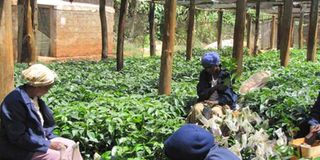New coffee variety expected to help boost yields, reduce production cost by 30pc

Women graft seedlings of an improved variety of Ruiru 11 coffee at the Sasini Coffee Estate nursery in Ndumberi, Kiambu County. The new coffee variety is expected to boost yields and reduce production costs. PHOTO | OLIVER MUSEMBI | NATION MEDIA GROUP
What you need to know:
- The grafted Ruiru 11 is deep-rooted and requires no spraying for leaf rust and coffee berry diseases.
- He said another advantage is that the variety is narrowly spaced and not staggered like the conventional varieties.
- The improved variety funded by the European Union is rain-fed and has more yields ranging between 15 and 20 kilos per tree twice a year.
A new variety of Ruiru 11 coffee is expected to reduce the cost of production by 30 per cent and also lead to higher yields.
Coffee Research Institute director Elijah Gichuru said the improved disease-resistant variety jointly developed by Sasini Coffee Ltd and the research institute produces more berries per tree and allows more plants per acre.
Speaking during a tour of the company’s plantation at Ndumberi in Kiambu County, Mr Gichuru said the future of coffee farming in the country is still bright despite many farms being converted to real estate.
“The institute jointly with other stakeholders is exploring avenues of introducing coffee in more rural areas and the lake region and also changing the cropping system to tackle climate change,” he added.
The improved variety funded by the European Union is rain-fed and has more yields ranging between 15 and 20 kilos per tree twice a year.
Sasini Group Manager Charles Njoroge said unlike the conventional varieties, the grafted Ruiru 11 is deep-rooted and requires no spraying for leaf rust and coffee berry diseases.
“We have given over one million seedlings to farmers during our field days and farmers are getting encouraged by its management and productivity” he said.
He said another advantage is that the variety is narrowly spaced and not staggered like the conventional varieties.




